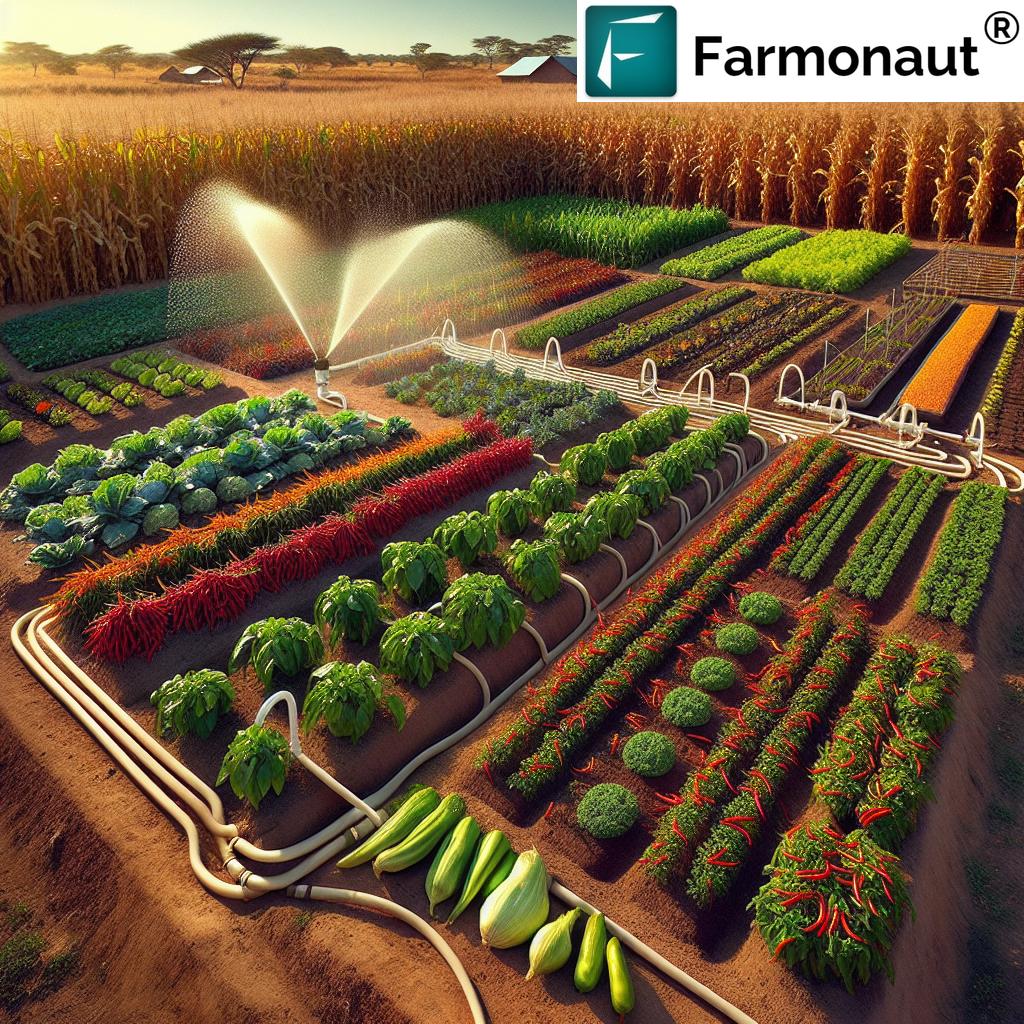Nigeria’s $180 Million Agricultural Fund: Boosting Smallholder Farmers and Food Security
“Nigeria’s new $180 million agricultural fund targets six priority crops, including rice, cassava, and maize.”
In a groundbreaking move to revolutionize Nigeria’s agricultural landscape, we are witnessing the emergence of a $180 million investment initiative that promises to address long-standing financing challenges in the sector. This significant development in agricultural funding is set to create a ripple effect, positively impacting smallholder farmers and bolstering the nation’s food security. As we delve into the intricacies of this ambitious project, we’ll explore how it aims to transform Nigeria’s agricultural sector and pave the way for sustainable growth.
The Nigeria Agricultural Development Fund (NADF): A Game-Changer for Agriculture
At the heart of this transformative initiative lies the Nigeria Agricultural Development Fund (NADF), a visionary program designed to tackle the persistent financing hurdles that have long plagued the country’s agricultural sector. During a recent media event in Abuja, Executive Secretary Muhammed Abu Ibrahim shed light on the pressing need for this substantial investment, emphasizing the critical role of both public and private sector partnerships in bridging the financial gap.

The NADF’s journey has not been without its challenges. Initially, the fund was expected to generate its operational capital through a 5% import duty levy on specific agricultural imports, including rice, sugar, poultry, and livestock. However, recent changes in government policy, particularly the implementation of import duty waivers on certain agricultural products by the President, have necessitated a shift in funding strategies.
Despite these setbacks, the NADF continues to receive crucial support through a 0.05% allocation from the Natural Resource Development Fund and budget appropriations. This resilience in the face of policy changes underscores the government’s commitment to revitalizing the agricultural sector.
Data-Driven Agriculture: The Foundation of NADF’s Strategy
A cornerstone of the NADF’s approach is the emphasis on accurate data collection and analysis. Recognizing the importance of reliable information in making informed decisions, the fund is collaborating with the Federal Ministry of Agriculture and other key stakeholders to compile comprehensive data on farmers across the country. This partnership with the Nigeria Bureau of Statistics (NBS) aims to create a robust database that will guide resource allocation and policy formulation.
To address the multifaceted challenges within the agricultural sector, the NADF has developed four tailored frameworks. These innovative solutions are designed to create sustainable pathways for growth and development in Nigerian agriculture.
Empowering Smallholder Farmers: NADF’s Targeted Approach
At the core of the NADF’s mission is the empowerment of smallholder farmers, who form the backbone of Nigeria’s agricultural sector. The fund has launched three groundbreaking projects specifically tailored to benefit these farmers:
- Credit Facilities with Lower Interest Rates: The NADF is working to provide credit facilities at reduced interest rates to banks, which in turn will offer more affordable loans to farmers and agricultural enterprises.
- Guaranteed Produce Offtake: This initiative ensures that smallholder farmers have a secure market for their produce, mitigating the risk of post-harvest losses.
- Infrastructure and Input Support: The fund is committed to developing essential infrastructure and providing crucial inputs to enhance agricultural productivity.
These projects are designed to create a supportive ecosystem for smallholder farmers by connecting them directly with processors. This approach not only fosters community engagement but also promotes backward integration in the agricultural value chain.
Priority Crops and Research Partnerships
The NADF has strategically identified six priority crops around which it will focus its support:
- Rice
- Cowpea
- Cassava
- Oil palm
- Millet
- Maize
To ensure the success of these priority crops, the fund has forged partnerships with six agricultural research institutes across Nigeria’s geopolitical zones. Additionally, a collaboration with the National Agricultural Seed Council (NASC) has been established to enhance seed quality, a crucial factor in boosting food production and ensuring food security.

Looking ahead, the NADF plans to convene meetings with research institutions and seed companies to inform them about government initiatives and encourage active participation. The fund aims to collaborate with both foundation seed companies and certified seed companies to maintain a steady supply of high-quality seeds, which are vital for agricultural advancement.
Promoting Inclusivity and Financial Inclusion
A notable aspect of the NADF’s initiatives is its commitment to promoting gender inclusivity and financial inclusion. The fund recognizes the importance of ensuring that women and underserved communities are actively engaged and supported throughout these agricultural developments. This comprehensive approach aims not only to boost production but also to create a more equitable agricultural landscape in Nigeria.
“The initiative aims to provide lower interest rates to farmers and develop essential infrastructure for food security.”
Key Components of Nigeria’s $180 Million Agricultural Fund
| Focus Area | Allocation (Estimated) | Expected Impact |
|---|---|---|
| Seed Quality Improvement | 25% | Enhanced crop yields and disease resistance |
| Agricultural Credit Facilities | 30% | Increased access to affordable financing for farmers |
| Research Partnerships | 15% | Innovation in farming techniques and crop varieties |
| Infrastructure Development | 20% | Improved storage, transportation, and irrigation systems |
| Sustainable Agriculture Solutions | 10% | Promotion of eco-friendly farming practices and resource conservation |
Leveraging Technology for Agricultural Advancement
In the digital age, technology plays a crucial role in advancing agricultural practices. While the NADF focuses on traditional aspects of agricultural development, innovative companies like Farmonaut are complementing these efforts with cutting-edge solutions.
Farmonaut, a pioneering agricultural technology company, offers advanced, satellite-based farm management solutions that could potentially enhance the impact of initiatives like the NADF. Through its android, iOS, web/browser App, and API, Farmonaut makes precision agriculture more accessible and affordable to farmers worldwide.
Learn more about Farmonaut’s innovative solutions:
For developers interested in integrating Farmonaut’s technology, explore their API and API Developer Docs.
The Role of Satellite Technology in Modern Agriculture
Satellite-based technologies, such as those offered by Farmonaut, can play a significant role in supporting initiatives like the NADF. These technologies provide valuable insights into crop health, soil moisture levels, and other critical metrics that can help farmers make informed decisions about irrigation, fertilizer usage, and pest management.
By integrating such technologies with traditional agricultural practices, Nigeria could potentially accelerate its progress towards achieving food security and sustainable agricultural development.
Challenges and Opportunities in Nigeria’s Agricultural Sector
While the NADF’s $180 million investment represents a significant step forward, Nigeria’s agricultural sector still faces numerous challenges. These include:
- Limited access to modern farming techniques and technologies
- Inadequate storage and transportation infrastructure
- Climate change impacts on crop yields
- Market volatility and price fluctuations
- Land tenure issues and conflicts
However, these challenges also present opportunities for innovation and growth. By addressing these issues through targeted investments and partnerships, Nigeria can unlock the full potential of its agricultural sector.
The Future of Nigerian Agriculture: A Vision of Prosperity
As we look to the future, the $180 million investment through the NADF paints a promising picture for Nigerian agriculture. By focusing on smallholder farmers, prioritizing key crops, and fostering research partnerships, this initiative has the potential to transform the sector significantly.
The success of this program could lead to:
- Increased food production and improved food security
- Enhanced livelihoods for millions of smallholder farmers
- Reduced dependence on food imports
- Emergence of Nigeria as a major agricultural exporter
- Sustainable and environmentally friendly farming practices
The Role of Technology in Enhancing Agricultural Productivity
As we continue to explore the potential of Nigeria’s $180 million agricultural fund, it’s crucial to recognize the role that cutting-edge technology can play in maximizing its impact. Innovations in agricultural technology, such as those offered by companies like Farmonaut, have the potential to revolutionize farming practices and significantly boost productivity.
Satellite-Based Crop Monitoring
One of the most promising technological advancements in agriculture is satellite-based crop monitoring. This technology allows farmers to:
- Track crop health in real-time
- Identify potential issues before they become severe
- Optimize resource allocation for irrigation and fertilization
- Make data-driven decisions to improve yields
By incorporating such technologies into the NADF’s initiatives, Nigeria could potentially see a significant increase in agricultural productivity across its priority crops.
AI-Powered Agricultural Advisory Systems
Artificial Intelligence (AI) is another game-changing technology in modern agriculture. AI-powered systems can provide personalized advice to farmers based on various factors such as:
- Local weather patterns
- Soil conditions
- Crop type and growth stage
- Historical yield data
These systems can help farmers make more informed decisions about planting times, pest control measures, and harvesting schedules, ultimately leading to improved crop yields and reduced resource waste.
Sustainable Agriculture and Environmental Conservation
As Nigeria invests in its agricultural sector, it’s crucial to prioritize sustainability and environmental conservation. The $180 million fund presents an opportunity to promote eco-friendly farming practices that can help mitigate the impacts of climate change while ensuring long-term food security.
Promoting Climate-Smart Agriculture
Climate-smart agriculture (CSA) is an approach that helps guide actions to transform agricultural systems to effectively support development and ensure food security in a changing climate. The NADF could allocate resources to promote CSA practices such as:
- Conservation tillage
- Crop rotation and diversification
- Agroforestry
- Efficient water management techniques
By adopting these practices, Nigerian farmers can increase their resilience to climate change while reducing their environmental footprint.
Investing in Renewable Energy for Agriculture
Another aspect of sustainable agriculture is the use of renewable energy sources. The NADF could support initiatives to integrate solar and wind power into farming operations, reducing dependence on fossil fuels and lowering operational costs for farmers in the long run.
Enhancing Agricultural Education and Training
For the $180 million investment to have a lasting impact, it’s essential to focus on capacity building within the agricultural sector. This involves enhancing agricultural education and providing ongoing training to farmers and agricultural professionals.
Modernizing Agricultural Curricula
The NADF could collaborate with educational institutions to update agricultural curricula, ensuring that they reflect the latest advancements in farming techniques, technology, and sustainable practices. This could include:
- Integrating precision agriculture concepts into coursework
- Providing hands-on experience with modern farming technologies
- Offering courses on agribusiness management and entrepreneurship
Establishing Farmer Training Centers
To reach smallholder farmers directly, the fund could support the establishment of farmer training centers across the country. These centers could offer:
- Workshops on improved farming techniques
- Training on the use of agricultural technologies
- Guidance on accessing financial services and markets
By investing in education and training, Nigeria can build a skilled agricultural workforce capable of driving innovation and productivity in the sector.
Strengthening Agricultural Value Chains
A comprehensive approach to agricultural development must consider the entire value chain, from production to processing and marketing. The NADF’s investment could be leveraged to strengthen these value chains, creating more opportunities for value addition and job creation within the sector.
Investing in Processing Facilities
By allocating funds for the development of processing facilities, the NADF can help reduce post-harvest losses and create new market opportunities for farmers. This could include:
- Setting up modern rice milling plants
- Establishing cassava processing centers
- Creating facilities for fruit and vegetable preservation
Improving Market Access
Enhancing market access is crucial for smallholder farmers to benefit from increased productivity. The NADF could support initiatives such as:
- Developing digital platforms for agricultural trade
- Improving rural road networks to facilitate transportation of produce
- Establishing cooperatives to increase farmers’ bargaining power
Leveraging Farmonaut’s Solutions for Agricultural Development
As we explore ways to maximize the impact of Nigeria’s $180 million agricultural fund, it’s worth considering how advanced technological solutions like those offered by Farmonaut could complement these efforts. Farmonaut’s satellite-based farm management solutions could provide valuable support in several key areas:
Precision Agriculture for Smallholder Farmers
Farmonaut’s technology could help democratize access to precision agriculture tools, making them available to smallholder farmers who form the backbone of Nigeria’s agricultural sector. This could lead to:
- More efficient use of resources like water and fertilizers
- Early detection of crop health issues
- Improved decision-making based on real-time data
Supporting Agricultural Research
The satellite data and analytics provided by Farmonaut could be invaluable for the agricultural research institutes partnering with the NADF. This data could help in:
- Monitoring the performance of different crop varieties
- Assessing the effectiveness of various agricultural practices
- Studying the impact of climate change on crop yields
Enhancing Agricultural Credit Facilities
Farmonaut’s technology could potentially support the NADF’s efforts to provide agricultural credit facilities by:
- Offering satellite-based verification of farms for loan applications
- Providing data to assess crop health and potential yields, aiding in risk assessment for lenders
- Monitoring crop progress throughout the growing season
By integrating such advanced technologies, Nigeria could potentially accelerate its progress towards achieving food security and sustainable agricultural development.
FAQs about Nigeria’s $180 Million Agricultural Fund
Q: What is the primary goal of the $180 million agricultural fund in Nigeria?
A: The primary goal is to address financing challenges in the agricultural sector, support smallholder farmers, and boost overall productivity to enhance food security in Nigeria.
Q: Which crops are considered priority crops under this initiative?
A: The initiative focuses on six priority crops: rice, cowpea, cassava, oil palm, millet, and maize.
Q: How will smallholder farmers benefit from this fund?
A: Smallholder farmers will benefit through access to lower interest rate loans, guaranteed produce offtake, and provision of essential infrastructure and inputs.
Q: What role do research partnerships play in this initiative?
A: Research partnerships with agricultural institutes and the National Agricultural Seed Council aim to improve seed quality and develop innovative farming techniques.
Q: How does the fund address gender inclusivity in agriculture?
A: The initiative includes a focus on promoting gender inclusivity and financial inclusion, ensuring active engagement and support for women in agricultural development.
Q: Can technology like satellite-based solutions complement this initiative?
A: Yes, advanced technologies such as satellite-based farm management solutions can potentially enhance the impact of the fund by providing real-time data and insights to farmers and researchers.
Conclusion: A Bright Future for Nigerian Agriculture
Nigeria’s $180 million agricultural fund represents a significant step towards transforming the country’s agricultural landscape. By focusing on smallholder farmers, prioritizing key crops, and leveraging both traditional knowledge and modern technology, this initiative has the potential to revolutionize Nigerian agriculture.
As we’ve explored throughout this article, the success of this program could lead to increased food production, improved livelihoods for millions of farmers, reduced dependence on imports, and the emergence of Nigeria as a major agricultural exporter. Moreover, by integrating sustainable practices and cutting-edge technologies, Nigeria is positioning itself at the forefront of modern, efficient, and environmentally conscious agriculture.
The journey ahead is undoubtedly challenging, but with continued investment, innovation, and collaboration between government, research institutions, and technology providers, Nigeria is well-positioned to achieve its agricultural potential and ensure food security for generations to come.















